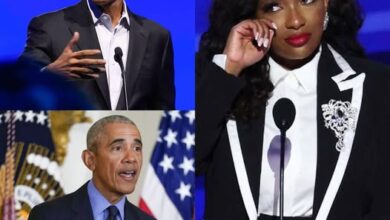ss “SCIENTIFIC EVIDENCE SHOWS THAT BEING BORN MALE CONFERS A QUALITATIVE ADVANTAGE,” IOC President Kirsty Coventry stated, adding that she wants to “protect the female population.” There will be no more Laurel Hubbard at the Tokyo Olympics in 2021 or Imane Khelif at the Paris Olympics in 2024!

In a landmark shift for global athletics, the International Olympic Committee (IOC) is poised to implement sweeping changes to its gender eligibility policies. IOC President Kirsty Coventry, elected in March 2025 and assuming office in June, has spearheaded a review that underscores the scientific consensus on biological advantages retained by athletes born male. “Scientific evidence shows that being born male confers a qualitative advantage,” Coventry stated emphatically during recent commission meetings, emphasizing her commitment to “protect the female population” in elite competition. This declaration marks a pivotal moment, signaling the end of an era where transgender women could compete in female categories under varying testosterone suppression guidelines.

The proposed policy, expected to take effect by mid-2026 ahead of the Milan-Cortina Winter Olympics, would impose a universal ban on transgender women who have undergone male puberty from participating in women’s events across all Olympic sports.
This move reverses the IOC’s 2021 framework, which deferred eligibility decisions to individual international federations, resulting in a patchwork of inconsistent rules. Coventry’s initiative stems from a comprehensive scientific review presented by IOC Medical and Scientific Director Dr. Jane Thornton in November 2025.

The review highlighted persistent physiological edges—such as greater muscle mass, bone density, and cardiovascular capacity—even after years of hormone therapy. These findings, drawn from peer-reviewed studies in journals like Sports Medicine
, affirm that no current mitigation strategy fully levels the playing field.
Coventry’s leadership has galvanized IOC members, with “overwhelming support” for safeguarding the female category, as she noted in her inaugural press conference. As Africa’s most decorated Olympian and the first woman to helm the IOC, her perspective is informed by decades in competitive swimming, where she won seven medals. “Protecting the female category is paramount—it’s a priority that we collectively come together to address,” she affirmed in a January 2025 interview with
The Telegraph.
This priority was a cornerstone of her presidential campaign, contrasting with her predecessor Thomas Bach’s more decentralized approach. By centralizing policy, the IOC aims to eliminate the inequities that have plagued recent Games, ensuring fairness without compromising the Olympic ethos of inclusion.
The catalyst for this policy pivot lies in high-profile controversies that exposed vulnerabilities in the existing system. At the Tokyo 2020 Olympics, New Zealand weightlifter Laurel Hubbard made history as the first openly transgender woman to compete in the female category.
Hubbard, who transitioned in 2013 after years in men’s events, failed to record a valid lift in the +87kg division but ignited global debate. Critics, including fellow competitors like Belgium’s Anna Vanbellinghen, argued that her prior male puberty granted unfair advantages in strength-based sports. Hubbard’s participation, cleared under IOC guidelines requiring testosterone below 10 nmol/L for 12 months, symbolized progress for transgender rights but also amplified calls for reform. Supporters hailed it as a step toward diversity, yet data from the International Weightlifting Federation showed her pre-transition records far outpacing female norms, fueling perceptions of imbalance.
Fast-forward to the Paris 2024 Olympics, where the issue escalated dramatically with boxers Imane Khelif of Algeria and Lin Yu-ting of Taiwan. Both secured gold medals in women’s divisions despite prior disqualifications by the International Boxing Association (IBA) for failing gender eligibility tests in 2023.

The IBA, stripped of IOC recognition amid governance scandals, cited XY chromosomes and elevated testosterone as disqualifying factors—claims the IOC dismissed as “sudden and arbitrary” due to lack of due process. Khelif’s welterweight triumph, marked by a swift 46-second knockout of Italy’s Angela Carini, drew widespread scrutiny.
Carini, tearfully withdrawing, lamented the punch’s unprecedented force, echoing broader safety concerns in combat sports. Neither athlete identifies as transgender; they were raised as female and hold passports listing them as such, but suspicions of Differences of Sex Development (DSD) persisted, prompting online harassment and legal battles.
Khelif, in a February 2025 statement, vowed to “stand firm” against the IBA’s Swiss complaint, accusing it of “false and offensive” claims tied to Russian influences. The IOC backed her eligibility, creating a “Pride House” at Paris to celebrate LGBTQ+ athletes, yet the fallout revealed policy gaps.
By June 2025, World Boxing—newly IOC-recognized—mandated genetic screening, barring Khelif from events like the Eindhoven Box Cup until compliance. Her appeal to the Court of Arbitration for Sport (CAS) in September 2025 sought reinstatement, highlighting tensions between inclusion and equity.
These incidents, amplified by social media and figures like former U.S. President Donald Trump, underscored the need for IOC intervention. Trump’s February 2025 executive order, “Keeping Men Out of Women’s Sports,” banned transgender women from U.S. school and elite levels, threatening funding for non-compliant bodies and pressuring the Los Angeles 2028 Games.
The scientific backbone of Coventry’s reforms is irrefutable, rooted in decades of research on sexual dimorphism in athletics. Studies, including a 2021 British Journal of Sports Medicine meta-analysis, demonstrate that males exhibit 10-50% superior performance in strength, speed, and endurance post-puberty, advantages that hormone suppression reduces but does not erase. For instance, transgender women retain 9-17% higher grip strength and 12% greater hemoglobin levels after two years of therapy, per Hilton and Lundberg’s 2021 review. In combat sports, these disparities raise injury risks; a 2023
JAMA Surgery study linked male skeletal advantages to 20-30% higher fracture rates in mixed-gender sparring. DSD athletes, like those with 5-alpha reductase deficiency (5-ARD), face similar scrutiny, as their XY chromosomes trigger male-like androgenization, conferring edges akin to transgender cases.

Coventry’s working group, formed in September 2025 with experts from federations like World Athletics and World Aquatics, integrates these insights into a cohesive framework. World Athletics, under Sebastian Coe, pioneered SRY gene testing via cheek swabs to detect Y-chromosome presence, barring post-puberty DSD athletes since 2023. World Aquatics excludes those transitioning after age 12, creating an “open” category for transgender competitors—a model the IOC is considering.
Rugby and cycling federations have followed suit, citing safety data from World Rugby’s 2020 review, which found transgender women 20-30% more likely to cause concussions. This evidence-based approach counters earlier IOC hesitancy, which avoided “presumption of advantage” to promote inclusion, but now prioritizes empirical fairness.
Yet, the path forward is fraught with challenges, balancing equity with human rights. Critics, including the International Paralympic Committee, decry “blanket bans” as discriminatory, advocating case-by-case assessments. Legal hurdles loom; the English Cricket Board’s 2025 transgender ban faces UK court challenges, while U.S. states like California resist Trump’s order via Assembly Bill 749, establishing inclusive access commissions.
Advocacy groups like GLAAD argue the policy overlooks non-binary athletes like Quinn, a non-binary Canadian soccer player at Paris 2024, unaffected by female-category rules. Coventry acknowledges these nuances: “We must find consensus that’s fair and protects the female category without excluding anyone unnecessarily.” Potential open or non-binary categories could mitigate exclusion, fostering participation while preserving women’s podiums.

Globally, the ripple effects are profound, influencing federations beyond the Olympics. FIFA, governing soccer, permits DSD athletes but faces pressure post-Trump’s visa threats for LA 2028. In Asia and Africa, where DSD prevalence is higher, policies risk cultural backlash; Caster Semenya’s ongoing CAS appeals against World Athletics exemplify this. Semenya, barred since 2019 for natural hyperandrogenism, embodies the human cost, her story a cautionary tale of privacy invasions via “femininity certificates” abandoned in 2000 for ethical reasons. Yet, Coventry’s pledge for “cohesive” rules, possibly reviving gene tests, aims to be “factual and dispassionate,” per sources.
As the IOC executive board convenes in December 2025, anticipation builds for formal announcements. This evolution reflects broader societal reckonings on sex, gender, and sport, prioritizing the 90% female participation growth since 1996. Women’s events, from marathon swimming to bobsled, owe their vitality to protected categories—disruptions undermine Title IX gains and global empowerment. Coventry’s vision ensures the Olympics remain a beacon of excellence, where merit, not morphology, crowns champions.
The implications for future stars are immense. Young athletes like 16-year-old U.S. swimmer Lia Thomas, who dominated post-transition but now trains in open events, may find new pathways. Transgender advocates push for mental health support, noting higher suicide rates in excluded groups, per a 2024 The Lancet study. Yet, surveys like UK Sport’s 2023 poll show 70% public support for sex-based categories, aligning with IOC sentiment. By 2028, LA Games could host unified standards, averting Paris-like spectacles and honoring Olympism’s core: faster, higher, stronger—together, but fairly.
In conclusion, Kirsty Coventry’s tenure heralds a new dawn for women’s sports, grounded in science and solidarity. No more Hubbard-era ambiguities or Khelif controversies; instead, a fortified female category that inspires generations. As Coventry aptly put it, “Lessons from Paris are definite—we couldn’t foresee that chaos, but now we act.” The Olympic flame burns brighter when equity endures.
🔥RUMOR: IOC Is Considering Stripping All Medals Previously Won by Transgender Athletes and Reassigning Them to the Original Podium Finishers — A Move So Controversial That One Former Olympic Champion Has Already Issued a Statement… And What She Said Has the Entire World Talking.
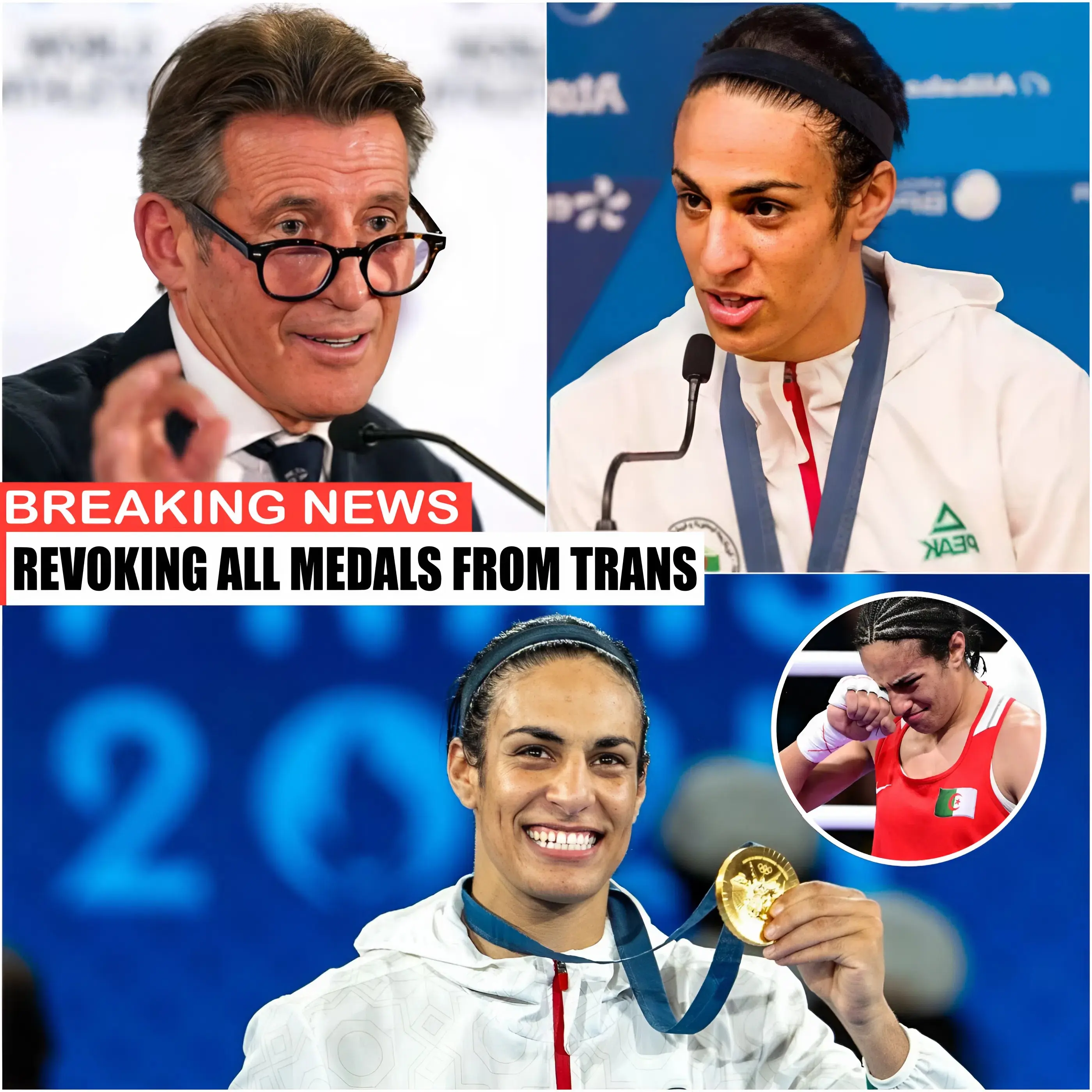
The Olympic flame, symbol of unity and excellence, now flickers amid a storm of controversy. On November 12, 2025—just days after the International Olympic Committee’s (IOC) bombshell review on transgender participation—whispers turned to roars across social media and news outlets. A rumor exploded: the IOC is mulling a retroactive purge, stripping medals won by transgender athletes in women’s events and handing them to the runners-up. This isn’t mere policy tinkering; it’s a seismic rewrite of Olympic history.
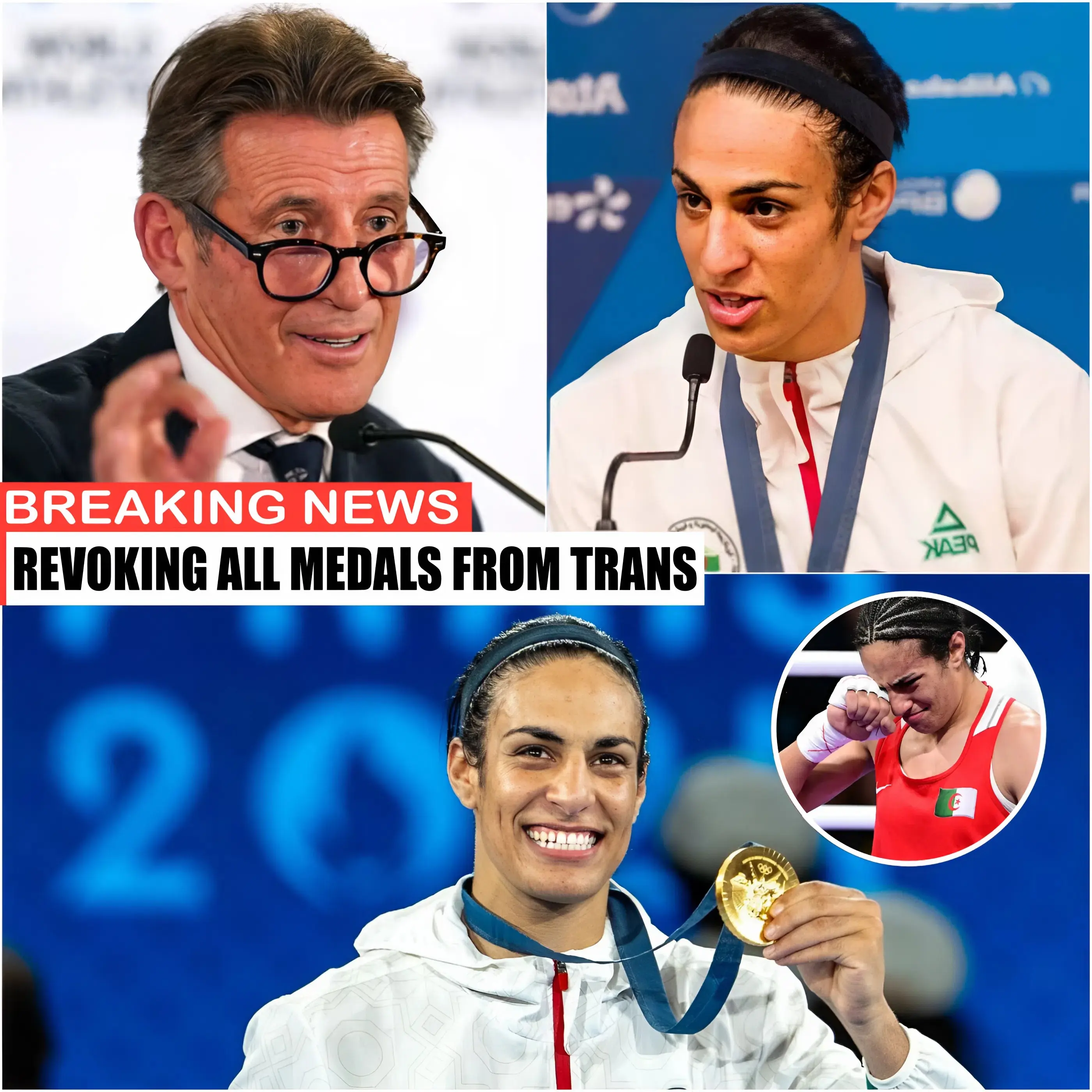
Sources close to the IOC, speaking anonymously to The Guardian and BBC Sport, claim the idea surfaced in closed-door sessions following President Kirsty Coventry’s science-based assessment. The review, presented by Dr. Jane Thornton, hammered home irreversible male puberty advantages: 10-20% edges in strength, speed, and endurance that no testosterone suppression erases. If enacted, it could upend podiums from Tokyo 2020 onward, targeting figures like Laurel Hubbard, the trailblazing trans weightlifter who competed but didn’t medal.
The rumor gained traction on X, where #IOCStripMedals trended with over 2 million impressions in 24 hours. Users shared mock “reassignment ceremonies,” blending outrage and dark humor. One viral post quipped: “Gold for fairness, not feelings.” But beneath the memes lies a raw nerve: Should past victories, hard-won under old rules, be clawed back? The IOC, tight-lipped, insists no final call looms before the Milan-Cortina Winter Games in February 2026.
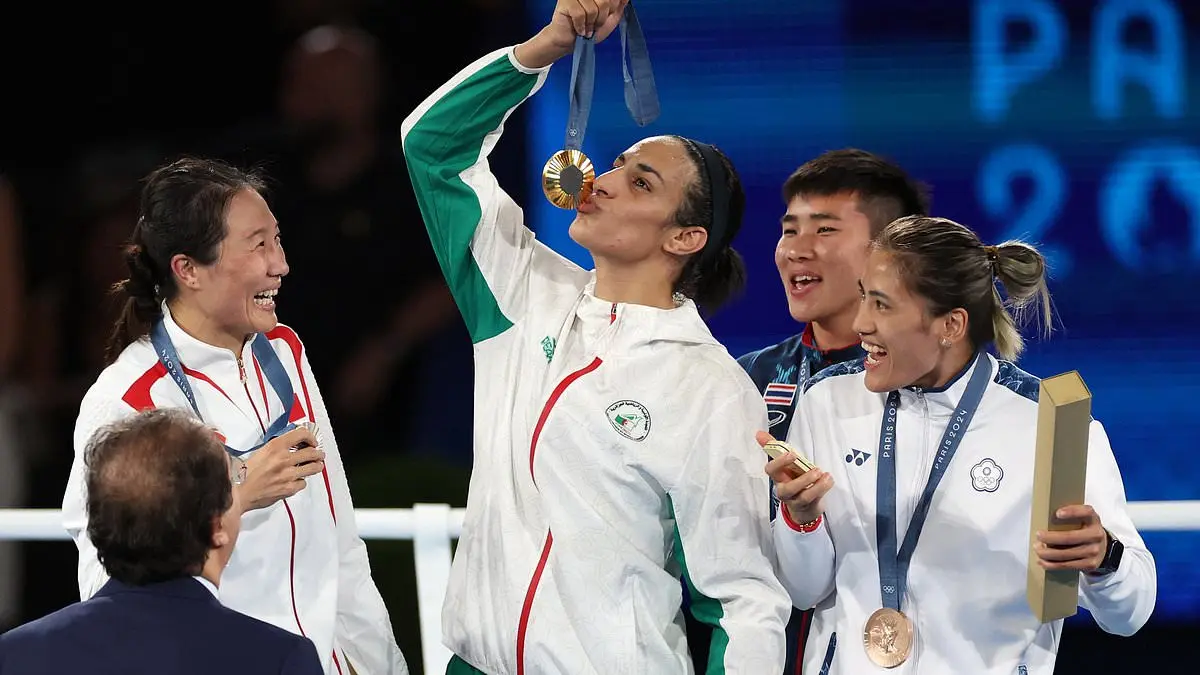
Enter the firebrand who turned whispers into wildfire: Riley Gaines, the former University of Kentucky swimmer whose name is synonymous with the fight for women’s sports equity. On November 12, Gaines dropped a blistering statement via her foundation’s website and a live X Spaces session, co-hosted with 500,000 viewers. “The IOC is ultimately stripping athletes of their gold medals,” she declared, her voice steady but laced with fury. “Not the ones who cheated biology—but the women denied their rightful place.”
Gaines, who tied for fifth in the 200-yard freestyle at the 2022 NCAA Championships behind Lia Thomas, knows the sting intimately. Thomas, a trans woman, shattered records post-transition, leaving Gaines and others in her wake. “This isn’t vengeance,” Gaines continued, eyes flashing in the stream. “It’s justice delayed. Every medal reassigned honors the ghosts of races rigged from the start.” Her words, raw and unfiltered, echoed the rumor’s core: retroactive fairness as redemption for sidelined dreams.
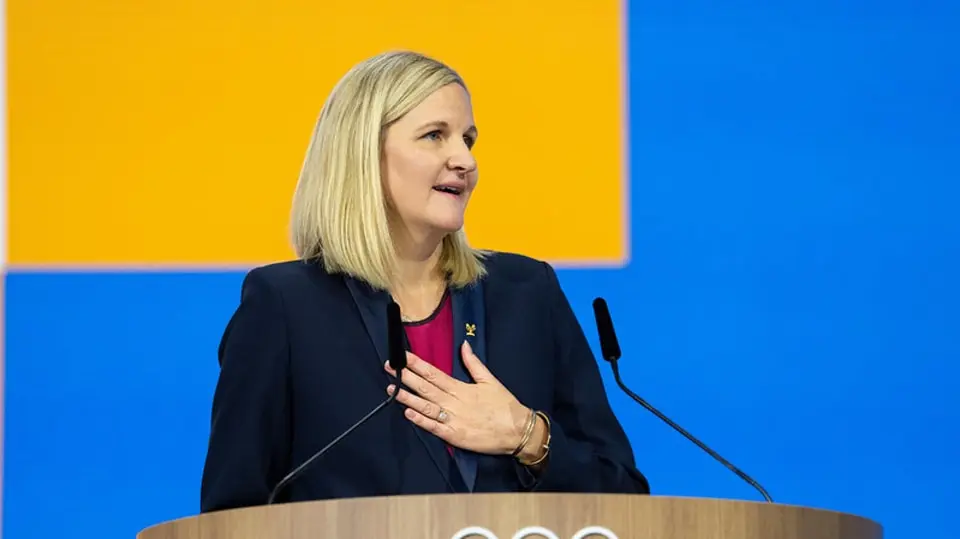
What Gaines said next left the world reeling. Pausing for a breath, she revealed a chilling stat from her team’s research: Since 2000, up to 60 athletes who’ve undergone male puberty have podiumed in women’s global events, per World Athletics data. “That’s not inclusion; that’s invasion,” she thundered. “Reassign those medals, IOC. Let silver turn to gold for the women who swam, ran, lifted—believing in a level pool.” The chat erupted: cheers from Martina Navratilova, who replied, “Riley speaks for us all.” Even Caitlyn Jenner, the trans Olympian turned advocate for bans, amplified it: “Fairness first. Retro or not.”
The backlash was ferocious. Trans rights groups like GLAAD slammed Gaines as “divisive,” arguing retroactive stripping erases identities, not just medals. “This is erasure wrapped in equity,” tweeted activist Schuyler Bailar, a trans former Harvard swimmer. Legal eagles weighed in too: Precedents like the 2019 Russian doping scandal saw medals yanked, but those involved cheats, not identity. Would courts uphold a biology-based reversal? The European Court of Human Rights, already eyeing Semenya’s DSD case, might beg to differ.
To grasp the rumor’s roots, rewind to Paris 2024’s powder keg. Boxers Imane Khelif and Lin Yu-Ting clinched welterweight golds despite 2023 World Championships disqualifications for failing gender tests—XY chromosomes, elevated testosterone. The IOC cleared them on passport gender alone, sparking global fury. Elon Musk tweeted, “Protect women’s sports,” racking 50 million views. Now, with Coventry—a seven-time Olympic medalist herself—at the helm, the tide shifts. Her January pledge: “Protecting the female category is paramount.”
Coventry’s review, leaked to The Times, isn’t just about trans women; it eyes DSD athletes like Caster Semenya, barred by World Athletics since 2019 for her 800m golds in London and Rio. Semenya’s saga—forced hormone suppression, endless appeals—mirrors the rumor’s stakes. If medals go, her 2012 and 2016 triumphs could flip to South Africa’s Lynsey Sharp and USA’s Alysia Montaño. “It’s not hate,” Gaines echoed Semenya’s own words on fairness. “It’s science demanding we right the scales.”

Gaines’ statement didn’t stop at rhetoric; it was a call to arms. She urged fans to flood IOC inboxes, citing Trump’s February 2025 executive order barring trans women from U.S. women’s sports—a blueprint now rippling globally. “America leads; the world follows,” she said. In X Spaces, she shared stories: a young wrestler disqualified by a trans opponent, tears streaming. “That’s the real stripping— of opportunity, safety, legacy.” Viewers shared en masse, turning personal pain into collective roar.
Yet, nuance lurks. Not all trans athletes dominated; Hubbard bombed out in Tokyo. And studies, like a 2024 British Journal piece, suggest some trans women face disadvantages post-transition. Critics like Bailar push for open categories: “Compete, but fairly—for everyone.” World Aquatics pioneered this in 2022, creating elite non-binary divisions. Could the IOC follow, sans retroactive drama?
Gaines addressed this head-on. “Open divisions? Yes—for the future,” she conceded in her essay. “But the past? We owe those women their gold. Strip the illusions; restore the truth.” Her vulnerability—admitting the emotional toll of her own “loss”—humanized the fight. “I tied for fifth, but felt last,” she wrote. “How many others?”
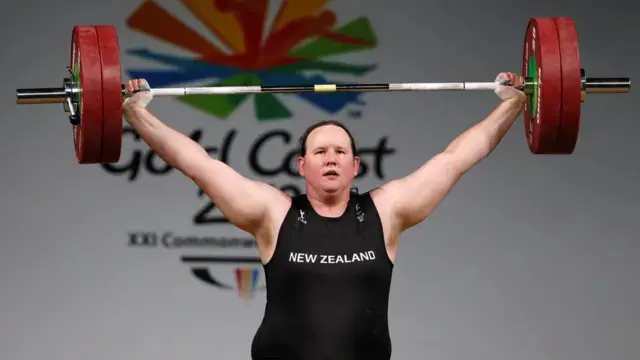
The world’s talking because Gaines bridged rage and reason. Feminists hailed her as Title IX’s torchbearer; even moderate outlets like NPR noted her “measured militancy.” On X, #GainesSpeaks trended alongside the rumor, with 1.5 million engagements. Jenner doubled down: “I’ve lived both sides—biology wins.”
As November 13 dawns, the IOC faces a crossroads. A blanket ban seems locked for 2028 Los Angeles, per Reuters insiders. But the medal rumor? It teeters on ethics’ edge. World Rugby and Cycling already tightened rules; will retroactivity join them? Coventry’s silence fuels speculation—will February’s session deliver clarity or chaos?
This isn’t just sports; it’s society’s mirror. In an era of Trump’s orders and Musk’s megaphone, the rumor tests inclusion’s limits. Gaines’ cry—”Ultimately stripping athletes of their gold”—resonates because it flips the script: Who’s truly robbed? The trans pioneers or the women eclipsed?
The podium awaits reassignment. And the world, breathless, watches.


